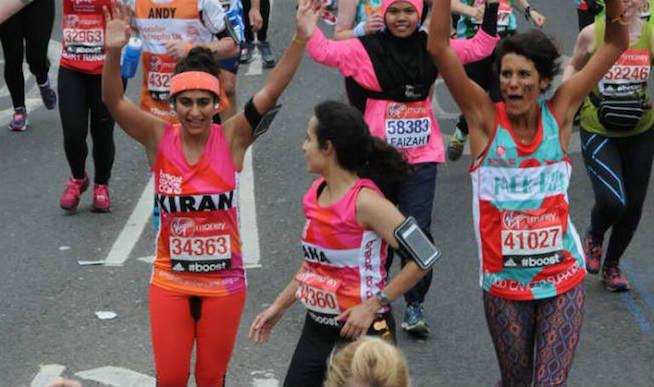
Kiran Gandhi finishing the marathon. Image from ABP Live.
Covering 26.2 miles by your own will and determination is no small feat. Things that usually matter, like appearance and personal hygiene are completely irrelevant by the time most athletes reach say, mile 15.
ICYMI: Harvard grad Kiran Gandhi, age 26, ran the 2015 London Marathon while menstruating. This became “newsworthy” because she opted to wear orange capris and no feminine protection. So basically, everyone who was paying attention to her crotch noticed some big ol’ red period stains.
On the marathon course, the needle on the modesty scale leans to the low side. Any seasoned runner who participates in races that draw athletes by the thousands has a collection of horror stories. I’ve run behind people with diarrhea all over their pants. I once pondered offering help to a woman who lost control of her bladder as she slowed to a walk while pee ran down her legs into her shoes. (I didn’t offer help, because I realized that there was nothing I could do.) At mile 18 of the Marine Corps Marathon, I considered asking a group of women to stand around me to provide some privacy so that I could stop to pee on the grass. I’ve seen all kinds of people stop for slabs of Vaseline to unabashedly slather their groin area (yeah, that’s a thing). Bleeding nipples. Chub rub that rubs raw and changes a runner’s gait. Tears. Madness. Hysteria. Vomit. The marathon course is an amazing physical and personal challenge that also doubles as a freak show if you pay enough attention.
Running a marathon is hard and overwhelming, but rewarding for most. Covering 26.2 miles by your own will and determination is no small feat. Things that usually matter, like appearance and personal hygiene, are completely irrelevant by the time most athletes reach, say, mile 15. Training for a marathon takes up so much of your life, and when race day finally comes, every ounce of effort, passion, strength, and dedication is used up to get to that finish line. There is very little room to give a shit about what you look like and what others might think.
When I first learned of the woman who ran a marathon with period blood running down her legs, I assumed she (unexpectedly) got her period in the middle of the race. And as unappealing as the sight and scent of any bodily fluid might be for the duration of 26.2 miles, I concluded that I might have done the same thing if I were surprised by my period. Running hundreds of miles over several months of training, waking before sunrise to get my long run done before the start of my day, watching what I ate, making sure I drank enough water all the time, and everything else that encompasses marathon training would not be diminished because of a few ounces of menstrual blood. No fucking way.
In her blog, Kiran wrote that she ran the marathon without using any form of feminine protection because “I thought, if there’s one person society won’t fuck with, it’s a marathon runner. If there’s one way to transcend oppression, it’s to run a marathon in whatever way you want. On the marathon course, sexism can be beaten. Where a woman’s comfort supersedes that of the observer. I ran with blood dripping down my legs for sisters who don’t have access to tampons and sisters who, despite cramping and pain, hide it away and pretend like it doesn’t exist.”
And this is one of the most ridiculous things I have ever read.
I mean I sort of get it. Women and girls all over the world have no solution for menstrual hygiene. So many have never seen a pad or tampon in their lives. And millions of women don’t even have washable cloth sanitary pads, or rags, or underwear. Some stay home and sit on cardboard during their periods. Some sit in dirt so they can easily bury the blood when it’s over. There are brilliant, creative, intelligent girls and women that can’t go to school or work at all when they have their periods. And it’s not because they’re whining like babies about menstrual cramps as they sip tea and pop Midol. It’s because they have no choice. Cultural taboos and superstitions about menstruation only add to the oppression of girls and women all over the world. The cycle of poverty perpetuates in many undeveloped countries because women cannot get an education because of this natural monthly occurrence. It’s horrifying.
But what does running a marathon and allowing your period blood to run down your legs have to do with this?
Having time for the training, recovery, and travel that is involved in running a marathon makes the very act a privilege. The suffering in a marathon is a privilege as well. It’s a gift that an athlete signs up for and wholeheartedly accepts. And those who have run this distance know that Kiran is right when she says that a marathon is where “a woman’s comfort supersedes that of the observer,” but this is true for every single athlete on the course, regardless of gender. The man with the bloody nipples and white T-shirt, the woman who can’t stop farting, the guy who stopped to vomit on the course three times, and the person 200 feet ahead of you with traces of diarrhea running down their leg.
“I ran with blood dripping down my legs for sisters who don’t have access to tampons and sisters who, despite cramping and pain, hide it away and pretend like it doesn’t exist. I ran to say, it does exist, and we overcome it every day.”
Well, OK. But we also overcome shit, piss, boogers, phlegm, pimples, cysts, blisters, and other issues related to bodily discharges that I don’t feel like describing right now. Does this mean society should embrace the proud display of these things as well? Did Kiran really help bring awareness to any REAL issues regarding menstruation? Or was this just a display of first-world slacktivism that grossed out even the most hardcore, tattoo-bearing, card-carrying feminists? Is anyone forever changed for the better now that they’ve seen a woman with menstrual blood on a marathon course, not in an impoverished country?
I hope Kiran uses her temporary spotlight. I hope she does more. Women and girls all over the world need a real solution to the fact that menstrual hygiene products are not available to them.







![By Magicland9 [CC BY-SA 3.0 (https://creativecommons.org/licenses/by-sa/3.0)], from Wikimedia Commons By Magicland9 [CC BY-SA 3.0 (https://creativecommons.org/licenses/by-sa/3.0)], from Wikimedia Commons](/sites/default/files/styles/profile/public/images/article/2019-06/Bell.png?itok=gWp6s_Y0)
